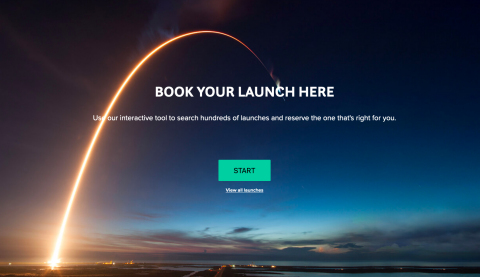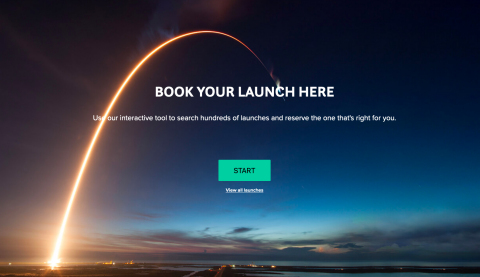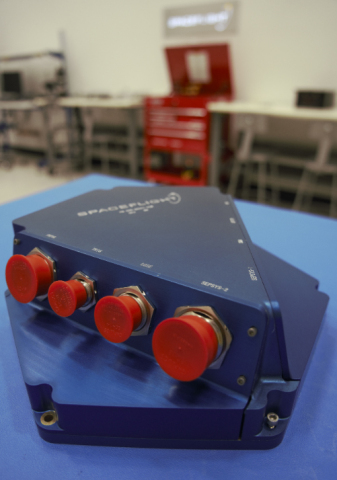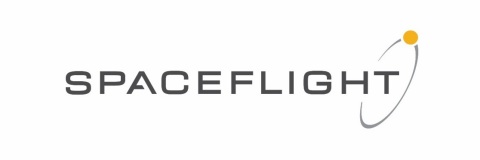SEATTLE--(BUSINESS WIRE)--Spaceflight Inc., the leading satellite rideshare and mission management provider, today announced, during the opening of Small Satellite Conference 2020, it is providing an array of new sweeping programs to deliver launch schedule assurance and greater flexibility to smallsat customers needing frequent, reliable, and cost-effective ways to get spacecraft on orbit.
“One thing we’ve learned about launching smallsats over the past 10 years is that there is a growing requirement for flexibility in everything from contracting to switching vehicles, orbital destinations, booking options, and integration services,” said Curt Blake, president and CEO of Spaceflight. “With our expertise working with all major launch vehicles, we have the unique advantage of building flexibility into all aspects of our business to meet our customers’ individual mission needs. It’s foundational to our vision of getting spacecraft on orbit exactly when and where our customers want, and we’re excited to unveil several first-of-their-kind programs to support it.”
Designed to increase flexibility across the entire launch spectrum, Spaceflight’s new services and programs include:
- Transparent pricing, no hidden fees: Combatting the standard practice of offering a low introductory per-kilogram launch price for smallsats and charging extra for flight hardware, spacecraft shipping, regulatory guidance or integration services, Spaceflight offers all-in pricing for its launch services.
- “Book My Launch” online reservation system: As easy as booking an airline flight, Spaceflight has developed a convenient way to book a smallsat launch completely online. Users simply specify their spacecraft configurations, indicate orbital destination, desired launch timing, and any extras such as insurance, fueling and licensing, and reserve with a credit card.
- “Mission Control” platform: Once booked on a launch, Spaceflight customers securely log into Spaceflight’s new Mission Control web platform to manage mission tasks, upload documents, access templates and FAQs, track progress and milestones. Everything associated with current and past launches is at your fingertips for easy, convenient and always-available mission management.
- New Sherpa orbital transfer vehicles: The company recently announced it will be flying the first in its portfolio of new space vehicles, Sherpa-FX, on its next SpaceX rideshare mission, slated no earlier than December 2020. The Sherpa-NG (next generation) family of orbital transfer vehicles provides the flexibility, orbital diversification, and mission assurance developers need, while reducing costs and improving lead times to get on orbit.
- Reconfigurable avionics: Spaceflight is actively developing a highly flexible and rapidly reconfigurable separation sequencer which provides industry-leading capabilities for small satellite deployments. In addition to custom sequencing scripts, the sequencer hosts communications hardware to independently downlink separation telemetry, and is designed to work with most available separation systems.
- Tracking and identifying spacecraft program: Spaceflight is introducing flight-proven technologies to help customers identify and track their spacecraft immediately following launch and deployment. With these tracking systems, customers will have access to information that can facilitate first contact and early operations, mitigate space congestion, and provide the foundation of effective and responsible space traffic management.
- New launch vehicles and agreements: Spaceflight works with a global portfolio of launch vehicles, including Falcon 9, Antares, Electron, Vega, and PSLV, to provide a variety of launch options to its customers. It has also signed launch agreements with emerging new vehicles, including NSIL’s SSLV, Relativity’s Terran 1, and Firefly’s Alpha, to accommodate customers’ specific mission plans.
“Delays in launch are inevitable but being able to switch launches when they occur is critically important to ensure our IoT network constellation gets on orbit as efficiently and expeditiously as possible,” said Kjell Karlsen, Chief Financial Officer of Astrocast. “Spaceflight not only offers an expansive portfolio of launch options, but their integration and mission management expertise in working with the various vehicles, as well as their experience with the international regulations and licensing, has given Astrocast a reliable and valuable partner. Working with Spaceflight has been a pleasure, and we’re looking forward to our next launch with them on their next SpaceX rideshare aboard the Sherpa-FX flyer.”
For more information on any of the new services, registered SmallSat 2020 attendees can visit Spaceflight’s virtual exhibit Monday-Thursday 10 a.m. to 1 p.m. MDT to talk with staff, or contact sales@spaceflight.com for more details.
Spaceflight has launched more than 270 satellites across nearly 30 rideshare missions. In 2019, the company successfully executed nine missions, the most it’s ever launched in one year, sending more than 50 payloads to space.
About Spaceflight Inc.
Spaceflight is revolutionizing the business of space transportation through its comprehensive and innovative suite of rideshare launch and mission management services. The company offers state-of-the-art satellite integration capabilities, including flight and ground support hardware, licensing and logistics management, and mission expertise to support each customer's specific mission needs. Spaceflight's diverse portfolio of launch partners across the globe enables the company to offer routine launch options and unprecedented launch flexibility. Based in Seattle, Spaceflight has successfully launched hundreds of satellites and is a part of the Mitsui & Co., Ltd. portfolio, operating as an independent, U.S.-based company. For more information, visit http://www.spaceflight.com.





